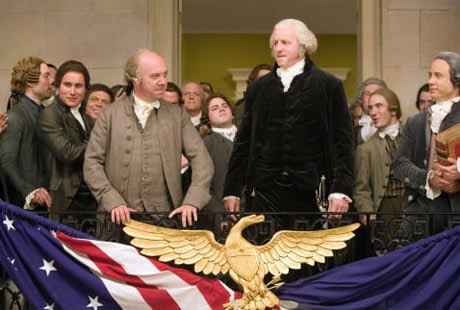Technically impressive and meticulously constructed, John Adams is burdened only with the weight of its own scope, attention to detail and the limitations of a lead actor who is visible more as Paul Giamatti than an historical figure. The historical literary crowd should be pleased with the lack of anachronisms and falsified melodrama but those looking for entertainment of any sort will be frustrated, with entire episodes dedicated to the endless whining of the Founding Fathers in powdered wigs, desperately shouting glib ideological perspectives with actorly fervour. The seven-part HBO miniseries follows John Adams (Paul Giamatti) from his younger days at the trial of the Boston Massacre, as well as his problematic appointment to minister plenipotentiary and his loan negotiations with the Dutch that helped raise capital for the American Revolution. It also covers his ineffective stint as the first Vice-President, in addition to his own presidency, which was marked with controversy and disdain surrounding his handling of the war between Britain and France, and his public disagreements with Thomas Jefferson (Stephen Dillane) on the subject. It is implied that his main error during his presidency was retaining the old cabinet, which was controlled by a contrary Alexander Hamilton (Rufus Sewell). The miniseries also makes an effort to examine Adams flawed but compassionate relations with his influential wife Abigail (Laura Linney) and how his familial absence impacted his children, who were left behind to discover their own priorities and belief systems. John Adams is painted as a stubborn, impetuous and incredibly single-minded man who struggled to live by his own values while incorporating the necessary level of sycophantic instincts needed to succeed in global relations. Giamattis portrayal of this figure succeeds more in his later years when he deals with issues of loss and regret. His depiction of Adams as a younger man is earmarked with the actors trademark overemotional preening, which makes this performance often indistinguishable from any other character he has ever played. On the other hand, Laura Linney plays Abigail Adams with a subdued strength thats entirely logical and convincing. Its an interesting and stylistically oppositional pairing that thankfully works, for the most part. Considering that the actors throughout the series are often forced to spout textbook dialogue and inhabit simplified versions of ideological/political values, it is impressive that they are able to make individual impact. In making a historically accurate drama, issues of organic conflict and narrative progression become secondary, making the product dry and often dull to watch. Impressive sets, art direction and secondary performances ameliorate this to some extent but not enough to make John Adams entirely recommendable to anyone other than the History degree crowd. The beautifully packaged DVD box set includes a "making of featurette that explores technical aspects of the film and the overall vision with insight. Also included is a glimpse at the life and works of author David McCullough and an interesting on screen historical guide called "Facts are Stubborn Things, which gives further sagacity into some filmmaking decisions.
(Warner)John Adams
Tom Hooper

BY Robert BellPublished Jun 18, 2008